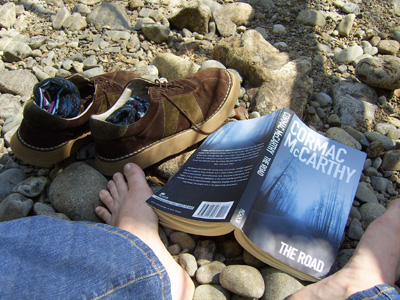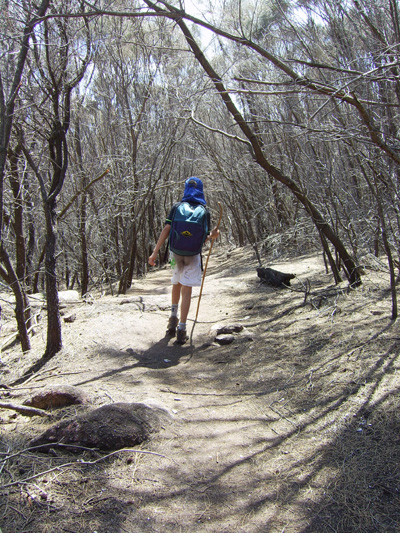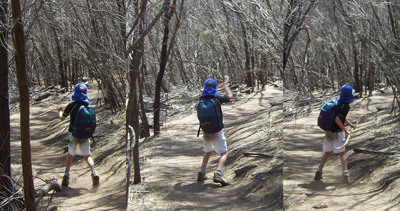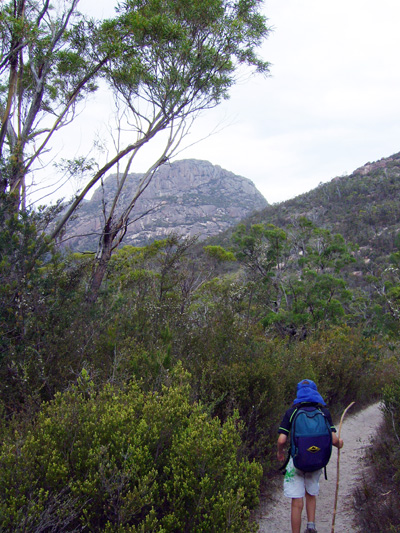The one thing that did disappoint me was the ending. SPOILER -- if you care. It was the way John Hillman centred the ending on the nuclear (ha!) family, including dog(! in a world where animals are gone! I know it was a symbol that these were good decent humans who wouldn't eat their pets let alone other humans, but still...) and not about the natural world that was lost, which is how the book ended. Always human human human human preoccupations.
The only concession to the idea of nature as it was came right at the beginning of the film; otherwise any nostaglia was reserved for the woman and things like a childhood home and a can of cola (great product placement, all through the movie). Human things. Yet the book mourns just as much for non-human things like sunlight and fish scales and trees as human things.*
That's my only objection.
When I came home I looked for my post about reading The Road in Tasmania on holiday, and realised with shock that I'd posted it on the now-gone Sarsaparilla blog without cross-posting here. So it's gone! I'm going to repost it now, probably without any of the final tweakings I'd made at the time of posting (I might add a few upon re-reading). Here goes:
Travelling The Road
(originally posted on Sarsaparilla, Dec 13, 2008)
Last summer Sophie Cunningham and I had an excellent conversation in the fresh air of the Melbourne Botanic Gardens about reading whilst travelling and how it influences your travels. We thought a series of short writings on the subject would be wonderful. She had a post she’d prepared earlier, but it’s taken me this long to cook something up.
When I travel I choose books to read without much thought to the impact they may have on the travelling. Maybe they have been saved for holiday reading because of their lightness of being, perhaps they are next on the bedside pile, sometimes they are bought along the way when there is nothing else to do. I didn’t mean to take Cormac McCarthy’s The Road with me to Tasmania; I’d already read it, a year before, and had lent it to my sister-in-law. She returned it just before we left and I hadn’t removed it from my daypack.
Reading on holiday is part of the holiday, and I read things that I feel like reading rather than things I should be reading. According to my reading ledger (a Moleskine notebook listing everything I’ve read since July 2000 when I got tired of keeping a diary and decided to record only the things I wanted to remember), I was reading the Philip Pullman trilogy on the boat across the Tasman and the days after our arrival, enjoying the differences between Northern Lights and The Golden Compass. Pure escapism mixed with daily dreaminess: the perfect holiday.
We -- my husband, my ten-year-old son and I -- started in northwest Tasmania, visiting tucked-away Tasmazia in all its faded glory in the depths of Brethren territory and then passed through numerous hamlets desperate to stay alive by cultivating affectations like thickets of topiary or blankets of mural. All of which, in retrospect (I think my favourite way of travelling) suited Pullman’s visions of multiple worlds.
We moved slowly southwest: Cradle Mountain, Zeehan, Strahan, up the Gordon River, picnicking on the Franklin, all the cartime listening to an audiobook – abridged, unfortunately – of His Natural Life, attempting to give the boy a feel for where we were. He was impressed, but unfortunately it also served to show us exactly how little Marcus Clarke knew the territory about which he was writing.
It was about this time, heading back to the east and Hobart, that I decided to re-read The Road. I re-read books constantly, usually after a gap of at least a year or more. I’m also extremely fond of dystopian writing, with particular fascination (Gen X that I am) for post-apocalyptic survival stories, although not so much the type that makes mankind revert to sword-and-shield pseudo-Celtic tribal structures. The first time I’d read The Road (Jan 2007, says the ledger) I remember reeling from the impact, unable to read anything else for a short time, coming down slowly from the sense of heightened insecurity any good post-apocalyptic book will inject a reader with. I was curious to see if, now that I knew what I was in for, the same thing would happen again.

To this point, Tasmania had been wild and magical and lush; the south-west has the potential to be threatening and dour, but had provided enough jollies to keep my imagination at bay. Tourists, including us, have permeated the toughness and softened the inhabitants who have come to know who butters their bread. I began the book during a quick picnic on the shore of the Franklin River, upstream, under a highway bridge, sitting on a boulder, half-listening to my husband talking about the part his brother played in the protests, the boy listening fascinated. Within the first few pages I’d stopped listening altogether, and was totally submerged in a wasted world. When I emerged to keep driving, all I could think about was how lucky I was to be among living things, all those trees, all that living water, all that protest.
We stopped briefly in a town in a valley full of enormous concrete pipes and electricity infrastructure, and I was there again:
What is that, Papa?
It’s a dam.
What’s it for?
It made a lake. Before they built the dam that was just a river down there. The dam used the water that ran through it to turn big fans called turbines that would generate electricity.
To make lights.
Yes. To make lights.
Can we go down and see it?
I think it’s too far.
Will the dam be there for a long time?
I think so. It’s made out of concrete. It will probably be there for hundreds of years. Thousands, even.
Do you think there could be fish in the lake?
No. There’s nothing in the lake. [17]
I initially read the book slowly, allowing myself to be distracted by the charms of Hobart and Port Arthur, putting the book aside in favour of television, local newspapers and trashy magazines. Five days later, we caught a very rough ferry over to Maria Island off the east coast, taking only what we could cart in a human-drawn wire wagon over the car-free roads of the National Park island.
The machine-free silence of the animal-filled camping ground was perfect for losing myself again in the animal-free surrounds of The Road. Twilight seemed long on the island, and it was a fair walk to the toilets. I’d never seen so many marsupials in one spot, and was afraid that if I squatted in the bushes surrounding the tent I’d get any kind of nasty surprise. Wandering back past the convict ruins, looking up at the pristine sky with more stars than human thoughts, looking around at the strange vegetation, looking down at the tent, I could have been living at any point of time.
He wet his finger and held it to the wind. When he rose and turned to go back the tarp was lit from within where the boy had wakened. Sited there in the darkness the frail blue shape of it looked like the pitch of some last venture at the edge of the world. Something all but unaccountable. And so it was. [41]
When I returned, looking into the tent at my son sleeping with his limbs splayed on his airbed was exquisite.
After Maria Island (not to be done in a day; we will be back for a longer stay), we went north up the coast to Coles Bay, a place I’d been years before on the honeymoon of a marriage that didn’t last. We were lucky enough to get a gorgeous camping spot in an area that is highly sought after and distributed by ballot: getting a last minute cancellation like we did is like winning the lottery. Clean, well-maintained individual spots with personal tracks to the beach and a view over the bay to the mountains called The Hazards.

Sitting on the beach with a torch, the book and the ominous clouds that settle over The Hazards every night without fail, no matter how blue-skied the day has been, I finished The Road on that first night at Coles Bay. Afterwards I put down the book, turned off the torch, and sobbed, watching the lights of the town twinkle to my right and listening to the other campers go about their evening drinking.
Next morning, before the others woke, I re-read the ending and other parts that had stuck with me, and sobbed again, silently into my pillow. I watched them wake. We all went for a bushwalk up The Hazards to Wineglass Bay and back, a full day of walking. I had done part of this walk before, and I may yet do the whole thing again, but I guarantee you, I will never be able do it again with such a heightened sense of emotion.
No lists of things to be done. The day providential to itself. There is no later. This is later. All things of grace and beauty such that one holds them to one’s heart have a common provenance in pain. Their birth in grief and ashes. So, he whispered to the sleeping boy. I have you. [46]
My husband is fit and strong and likes to walk fast. Normally patient, he becomes exasperated when thwarted in expending his excess energy. The first part of the walk was fraught with tensions as young man loped, older man barked, and I dreamed along in the rear, taking in every leaf, every bird, the shift in blues between the sky and the sea, the occasional lizard or marsupial. Once we’d reached what we thought was the halfway point and had a swim, I encouraged older he to leave us behind, to go at his own pace, and meet us back at the car where he could probably read most of the paper – and do the crossword – by the time we made it.
Once he’d disappeared around a bend, the tension lifted, and my son and I closed ranks and walked at our own pace. For the first six years of his life I was a single parent, and twice in that time he was close to death. Standing over his hospital bed I forced myself to envisage a life without him: bleak, but do-able. Ever since, he has been the most precious gift in my life with every day that he exists. He doesn’t remember much of that time, and he loves his stepfather intensely (as do I), but when we are alone there is an heart-muscle memory of such intensity that we invisibly clutch at each other.
We walked. He whistled. I laughed at the dark patch of sand-stain on his white swimming shorts. We entered a part of the landscape full of dead fire-blackened trees and grey dust, bleak and twisty. My imagination went into overdrive.
There were times when he sat watching the boy asleep that he would begin to sob uncontrollably but it wasn’t about death. He wasnt sure what it was about but he thought it was about beauty or about goodness. Things that he’d no longer any way to think about at all. They squatted in a bleak wood and drank ditchwater strained through a rag. He’d seen the boy in a dream laid out upon a coolingboard and woke in horror. What he could bear in the waking world he could not by night and he sat awake for fear the dream would return. [110/111]
I watched his tall, thin, fragile frame walk in front of me in the grey dust, the trees obscuring any part of the real world, and thought about a short story I’d once read in the New Yorker: a woman living in an apartment block thinking about how she would manage in a post-apocalyptic New York, whether she would have the guts to fight the woman in the next apartment for water, whether she would be resourceful enough to find what they needed in the streets around them. Written before 9/11, the story has haunted me with its questions about personal resilience and I wished I had kept a copy. I took out my camera and took a photo.

Before I could put the camera away from taking the above shot, my son suddenly began a series of what I think of as his ‘battle moves’: pretending he’s fighting some invisible enemy and winning.

They usually make me laugh, because he’s such a chicken in real life, hates the sight of blood, animal guts, won’t clean up messes because they’re messy. This time they touched me; he is so vulnerable, so open, so precious. What would happen if I wasn’t there?
And then we emerged from the dead wood into sunshine, pink rock, butterflies and sea sparkle. He would cope. He has his fathers. And he has this beautiful world. For now.

[*This, for those who don't know, is the ending:
Once there were brook trout in the streams in the mountains. You could see them standing in the amber current where the white edges of their fins wimpled softly in the flow. They smelled of moss in your hand. Polished and muscular and torsional. On their backs were vermiculate patterns that were maps of the world in its becoming. Maps and mazes. Of a thing which could not be put back. Not be made right again. In the deep glens where they lived all things were older than man and they hummed of mystery. [241]
A cut-out to the view and a voice-over of that para would have perfected the movie.]
7 comments:
Oh &! This is one of my favourite blog posts ever. Thank you for cross posting it here. I love how you tie you life up with your responses to literature without sentimentality.
The Road was such an intense reading experience for more that I don't think I could bear to watch the movie. Perhaps on DVD, 20 minutes at a time with short breaks to recharge the tissue collection.
I hope poor Kodi Smit-McPhee gets to act in a comedy soon.
And sorry for not proofreading my comment before clicking.
I agree about the fish.
absolutely wonderful post. thank you.
Thank you! both.
I agree about KSMcP: what an acting career, already!
Yep, beautifully integrated. Lucky you. Lucky all of us.
Entertaining post.
Gilly
Yes, yes and yes. I felt the same way as you about that book, although I am not ready to re-read it. It took me months to get over the bedtime fears that had begun to pervade my dreams. I had to talk about it incessantly with my husband to try to make sense of the story, what it meant and how it made me feel. And though I love Viggo to death, I just did not find myself immersed in the film. It didn't touch me the way I expected it to. The book was just so good.
Post a Comment